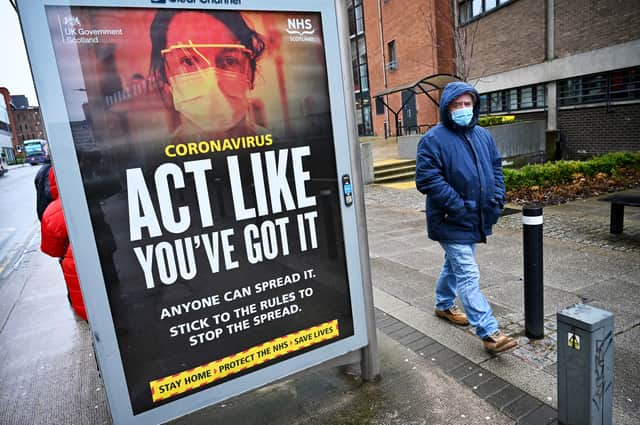GPs are calling for these symptoms to be added to the official Covid-19 list


As the Covid-19 pandemic continues, most of us now know the three main symptoms to keep an eye out for, as listed by the NHS.
These are:
- A high temperature, which means you feel hot to touch on your chest or back
- A new, continuous cough, which means coughing a lot for more than an hour, or three or more coughing episodes in 24 hours (if you usually have a cough, it may be worse than usual)
- A loss or change to your sense of taste or smell, which means that you may have noticed that you cannot smell or taste anything, or things smell or taste differently to normal
However, a growing number of GPs are now lobbying for the NHS to include a number of additional symptoms on the official list.
Advertisement
Hide AdAdvertisement
Hide AdIn an open letter, penned by Dr Alex Sohal, Honorary Clinical Senior Lecturer in Primary Care at Queen Mary University of London, over 140 GPs share their experiences of patients with Covid-19 in a bid to “change the Covid-19 case definition”.
The letter, titled ‘Open letter to Chris Whitty and Susan Hopkins: change Covid-19 case definition in line with WHO to save lives’, explains: “As GPs, we regularly review patients with mild symptoms - for example, a runny or blocked nose, sore throat, hoarseness, myalgia, fatigue, and headache - who subsequently turn out to be Covid-19 positive.”
Sohal says that “patients [with these symptoms] frequently have not even considered that they may have Covid-19, and have not self isolated in the crucial early days when they are most infectious”, and that only patients with the symptoms listed by the NHS are eligible to receive a test through the NHS.
‘Test more and reduce the spread’
Sohal urges the symptoms advertised by the NHS to be changed, to include a runny or blocked nose, sore throat and headache.
The open letter states: “The national publicity campaign focuses on cough, high temperature, and loss of smell or taste as symptoms to be aware of - only patients with these symptoms are able to access a covid-19 test online through the NHS test booking site.”
Instead, an increased focus in even milder symptoms could lead to identifying more infectious cases before they have a chance to spread.
“Tell the public, especially those who have to go out to work and their employers, that even those with mild symptoms (not only a cough, high temperature, and loss of smell or taste) should not go out, prioritising the first five days of self isolation when they are most likely to be infectious,” Sohal says.
She ends the letter by writing: “Test more of those with symptoms, identify more infectious cases, and reduce spread, implementing SAGE advice and saving lives.
Advertisement
Hide AdAdvertisement
Hide Ad“This will help to get - and keep - us out of this indefinite lockdown, as Covid-19 becomes increasingly endemic globally.
“Ignoring this will be at our peril.”
More symptoms to be aware of
Additionally, there are also a number of other symptoms that the general public should be aware of.
Tim Spector, lead scientist on the ZOE COVID Symptom Study app, and Professor of Genetic Epidemiology at King’s College London, says: “People need to know all the symptoms and not just focus on the three ‘official’ symptoms that miss over 20 per cent of cases.
“Headache, fatigue, diarrhoea, muscle pain, skipping meals and confusion are just some of the other symptoms associated with Covid-19.
“If anyone is suffering from any of these over the coming weeks, stay at home, self isolate and get a test.”
Spector also tweeted: “One in five people with Covid still present with less common symptoms that don’t get on the official PHE list - such as skin rashes.
“Seeing increasing numbers of Covid tongues and strange mouth ulcers. If you have a strange symptom or even just a headache and fatigue, stay at home!”